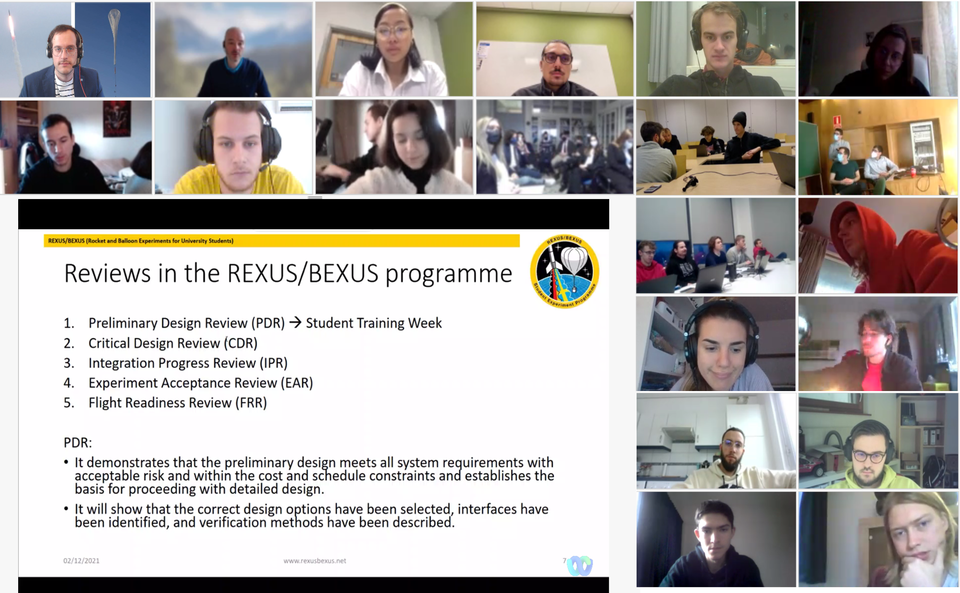New student teams selected to fly experiments on REXUS and BEXUS
In brief
The Swedish-German REXUS/BEXUS programme has launched into a new cycle. As part of the Swedish half of the programme, ten student teams, representing eight ESA Member States, have been selected to fly their experiments on a stratospheric balloon (BEXUS) or on a sounding rocket (REXUS).
In-depth

Due to the high quality of the proposals and the limited number of slots available on the launch vehicles, the decision process proved to be very difficult for the selection panel. In the end, ten SNSA/ESA sponsored teams were selected to participate in the REXUS/BEXUS programme, where they will design, build, test and fly their own experiments to the edge of space.
The teams selected to fly their experiment on board of the BEXUS 32/33 stratospheric balloons are:
- ALMA: Atmospheric Laser Measurement of Aerosols, from the Luleå University of Technology, Sweden
- HERCCULES: Heat-transfer and Environment Radiative and Convective Characterization in a University Laboratory for Experimentation in the Stratosphere, from the Polytechnic University of Madrid, Spain
- HERMES: Habited Exoplanet Research Measured by Eminence Stokes, from the University of Applied Sciences Western Switzerland (HES-SO), Switzerland.
- ROMULUS: Radio Occultation Miniaturized Unit for Leo and Upper Stratosphere, from the Sapienza University of Rome, Italy
- SPACIS: Sound Propagation in the Atmosphere using Complex Infrasonic Signals, from the university of Porto, Portugal
- TOTORO: Test Observations of Transient Objects and RadiO, from the Warsaw University of Technology, Poland

The teams selected to fly their experiment on the REXUS 31/32 sounding rockets are:
- BOOMERANG: Boom deploying Experiment with a Return to launch site Automated Non-propelled Glider, from the KTH Stockholm, Sweden
- DROPSTAR: Study of Oil Droplet Coalescence in Emulsions in Microgravity, from the Aristotle University of Thessaloniki, Greece
- PR4: Payload for Radiation measurement and Radio-interferometry in Rockets Revisited, from Eindhoven University of Technology, Radboud University Nijmegen, Utrecht University and HAN University of Applied Sciences, Netherlands
- SHEAR: Supersonic Heatshield Experiment Aboard REXUS, from Delft University of Technology, Netherlands
The REXUS/BEXUS programme is realized under a bilateral agency agreement between SNSA and DLR. Therefore, the 10 SNSA/ESA sponsored student teams will be joined by 6 further student teams sponsored by the DLR. Information about the German selection can be found here.
As next step, the selected student teams must develop their preliminary experiment design for a review held during a dedicated Student Training Week at the beginning of February.
Congratulations to all teams selected!

The REXUS/BEXUS programme is realised under a bilateral Agency Agreement between the German Aerospace Center (DLR) and the Swedish National Space Agency (SNSA). The Swedish share of the payload has been made available to students from other European countries through a collaboration with the European Space Agency (ESA). EuroLaunch, a cooperation between the Esrange Space Center of SSC and the Mobile Rocket Base (MORABA) of DLR, is responsible for the campaign management and operations of the launch vehicles. Experts from DLR, SSC, ZARM and ESA provide technical support to the student teams throughout the project. REXUS and BEXUS are launched from SSC, Esrange Space Center in northern Sweden.


